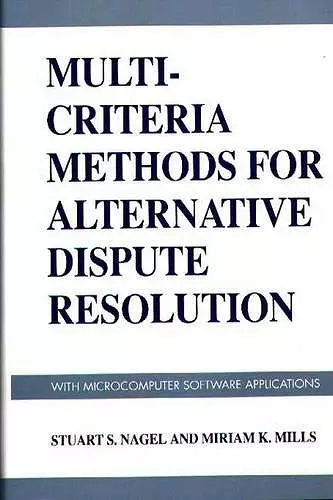Multi-Criteria Methods for Alternative Dispute Resolution
With Microcomputer Software Applications
Stuart S Nagel author Miriam K Mills author
Format:Hardback
Publisher:Bloomsbury Publishing PLC
Published:7th Dec '90
Currently unavailable, and unfortunately no date known when it will be back

This work examines the topic of dispute resolution, specifically the multi-criteria approach that seeks to arrive at a conclusion that is mutually beneficial to both sides. Through the use of decision-aiding software, the multi-criteria approach can allow each side to give on various criteria that are not important to it, but are important to the other side. In this way, a super-optimum solution may even be met, in which both sides receive something significantly better than they had expected. Such a result is very difficult, if not impossible, to achieve, Stuart Nagel points out, in traditional single-dimension dispute resolution.
Nagel and Mills describe the nature of multi-criteria dispute resolution utilizing decision-aiding software. The first part of the book clarifies the general character of computer-aided negotiation, computer-aided mediation, and super-optimizing dispute resolution. Part two guides the reader through the use of Policy/Goal Percentaging (P/G%) decision-aiding software, centering on general decision-making, negotiation, mediation, and prediction of outcomes. Multi-criteria resolution in the context of rule-making and legal policy disputes is the focus of part three, where such matters as determining initial alternatives and criteria, resolving deadlocks, and arriving at super-optimum solutions are discussed. Part four emphasizes dispute resolution in the context of rule-applying and litigation disputes, as well as mediation at the international level and between lawyers and clients. The final part deals with future applications, such as computer-aided mediation and group decision-making with phone modems. The book's combination of decision-aiding software, arbitration-mediation, and super-optimum expansionist decision-making brings a truly innovative approach to the topic of dispute resolution. This volume should be a welcome addition to academic, legal, and public libraries, and a valuable reference work for lawyers, law students, and legal professors and researchers.
ISBN: 9780899305202
Dimensions: unknown
Weight: unknown
288 pages